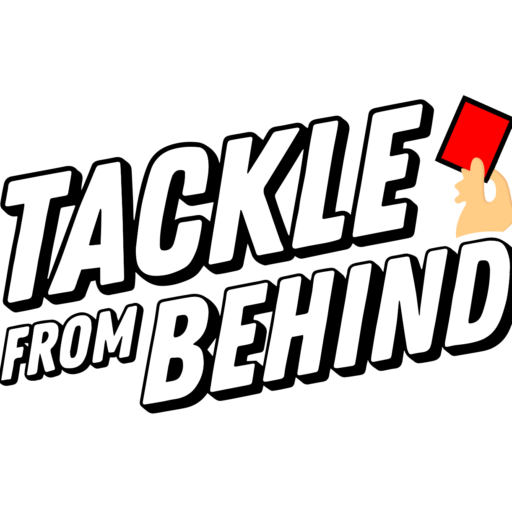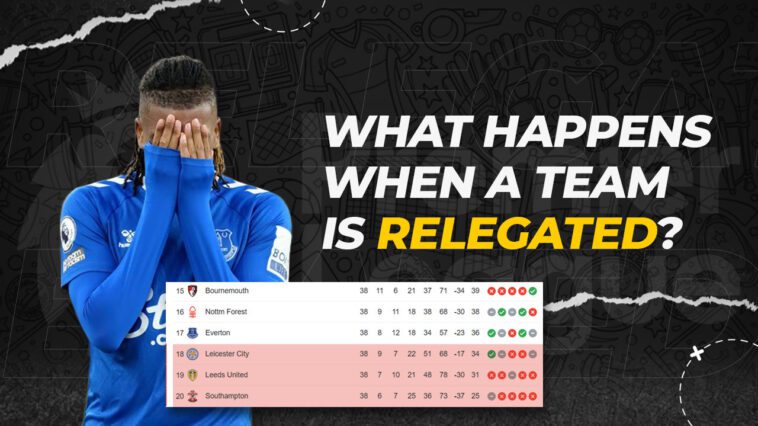Every year the bottom 3 teams in the points table are relegated from the premier league, Premier League relegation – every club’s worst nightmare. When a top-flight team gets demoted to a lower division after a bad season, it’s devastating. Star players flee, managers get fired, and clubs take a massive financial hit.
Want the ugly truth about what goes down? Keep reading to find out why relegation strikes fear into Premier League teams.
What Happens when a Premier League team is relegated?

When a Premier League team finishes in the bottom three of the table, they get automatically relegated. Simple as that. Down they go to the Championship – the second tier of English football below the top flight.
They replace the 3 teams that earned promotion to the Premier League from the Championship that season. The underdogs finally get their chance to mix it with the big boys as the fallen giants make way. A harsh changing of the guard.
Consequences of Premier League relegation
Relegation isn’t just a change of leagues though – it’s a complete shakeup that impacts every single part of the club. Here’s what really happens when that trap door opens up beneath a Premier League side:
Financial Hit
Financial Meltdown Oh hey there, poor house! Premier League riches get replaced by Championship poverty in the blink of an eye. Those gigantic TV deals, global sponsorships, and packed stadium matchday millions? Gone in an instant.
Yes, there are parachute payments to soften the blow. But it’s still just a fraction of the Premier League riches they’re used to. We’re talking budget slashed by tens of millions of pounds.
Star Players Leave
Speaking of the best players…they’re outta there at warp speed! Finding out global giants like Liverpool or Manchester United got relegated? You can bet superstars like Mo Salah and Marcus Rashford would be angling for a transfer within days.
Why would an in-demand, elite talent stick around to play in England’s second tier? They want Champions League football, Premier League glory and all the kudos that comes with it. A freshly relegated club just can’t offer that world-class platform anymore.

Just ask Leicester what happened when they went down. They lost James Maddison, Harvey Barnes, Youri Tielemans, and a pile of other stars in one window. A talented team getting torn apart.
Fans Stop Showing Up
The Premier League is a global phenomenon with fans across the planet tuning in. Games are box office events followed by millions. But the Championship? Not so much.
Once a huge club gets relegated, that worldwide fanbase tunes out fast. Even the diehards from the local community start staying away in their droves. Why pay good money to watch second-tier football every week when you’re used to the Premier League’s elite spectacle?
Suddenly, those once rocking, atmospheric stadiums become echoey ghost towns. The incredible noise and colour gets replaced by banks of empty seats and pitiful atmosphere. Soulless. And with sparse crowds, the club loses out on major matchday revenue to add to the financial woes.
Sponsors Bail
This domino effect even hits the sponsors. Companies pay Premier League clubs mega bucks to get their brand splashed across the world’s biggest sport television product. But a team in the Championship? These big hitters just don’t see the same marketing value in that.
As soon as a side gets relegated, you can expect sponsors to renegotiate their deals for waaaaay less money to reflect the diminished exposure. Or just terminate the contracts altogether and bail, leaving the club scrambling to find new commercial partners. Another huge income stream dries up overnight.
Job Losses
With money hemorrhaging from every single angle after that relegation, drastic cost-cutting becomes inevitable for clubs desperate to stay solvent. That means savage redundancies across the board.
Players, first-team coaches, academy staff, administrative employees, you name it – loads of hardworking people loyal to the club suddenly find themselves out of a job. It’s a brutal revolving door as the relegated side struggles to right-size for life in the Championship.
Fighting for Promotion
his nightmare isn’t a permanent death sentence though. Relegated teams are usually among the favorites to bounce straight back up via promotion from the Championship at the first attempt.
They’ll either need to finish in the top two automatic places to go straight back up. Or they can take the absolutely nail-biting playoff route if they finish between 3rd and 6th, winning that high-stakes knockout tournament.
But make no mistake – the Championship grind is absolutely relentless. We’re talking a grueling 46-game season, playing every few days, against hungry teams determined to beat the big boys. The pressure is always on, the competition is ferocious. Lots of big names have faltered and ended up trapped in that division purgatory for years.
How much do relegated Premier League teams get in parachute payments?
The Premier League makes crazy money from TV deals. So getting relegated and losing all that cash is a massive blow.
That’s why the Premier League gives relegated teams parachute payments. This money helps them stay afloat after going down.
Parachute payments are payments the relegated clubs get for 3 years. This helps them financially while not in the Premier League.
In the first year after relegation, they get 55% of the Premier League TV money they’d normally get.
The second year, it drops to 45%.
The third year, it’s only 20%.
So the payments get smaller each year to prepare them for life without Premier League cash.
The Rebuild Opportunity
Getting relegated is a total nightmare for any club. But some teams actually use it as a wake-up call. They realize they need to completely rebuild the whole club from scratch. It’s a harsh reality check, but one they need to reset and start over.
If they get promoted back to the Premier League properly, a short time in the lower leagues can actually spark a big club back to life. It’s the kick up the backside they need after being stuck in a rut for years.
It’s painful in the moment as all your stars jump ship and the money dries up. But it gives the club a chance to reshape the entire operation – from the ownership and boardroom, through the coaching staff, players, and philosophy, all the way down to the academy. Install a new culture from top to bottom.
The rebuild gets rid of any laziness or arrogance at the club. It makes them humble again. They can start fresh with a new winning mentality. Getting back to the Premier League feels even better after those tough years of grinding it out in the lower leagues.
So while relegation devastates in the short term, the regenerative process it sparks can ultimately pave the way for bigger and brighter days ahead for clubs who get it right. It’s a hard path, but one that storied faded forces like Nottingham Forest have used to reach new heights after years of underachievement.
Conclusion
Relegation from the Premier League sucks. No club wants to go through that.
It’s a huge financial blow. Teams also take massive emotional and structural hits.
But some clubs use relegation to rebuild and come back stronger.
The road back to the Premier League from the lower leagues is tough. It tests a club’s resilience, determination, and their fans’ loyalty.
While getting relegated is painful, it can also be a wake-up call. A chance for a fresh start and a brighter future.
FAQ
What happens when Premier League team is relegated?
The relegation rules in the Premier League are pretty simple. The three teams at the very bottom of the table at the end of the season get relegated down to the Championship.
Has a relegated team ever won the Premier League?
Blackburn Rovers were the first team to win the Premier League title, but then get relegated from the Premier League later on. This happened to them in the 1998-99 and 2011-12 seasons.
Leicester City and Manchester City had also been relegated from the Premier League before they eventually won their first titles.
Has a team ever won the Premier League and been relegated?
Manchester City are the only team that got relegated from the top division in England the season after winning the league title. This happened to them in 1937-38. The previous year they had won the league, but then only got 36 points the next season which saw them go down.



